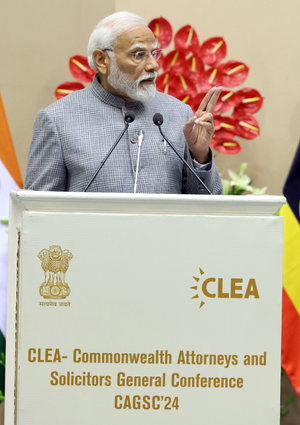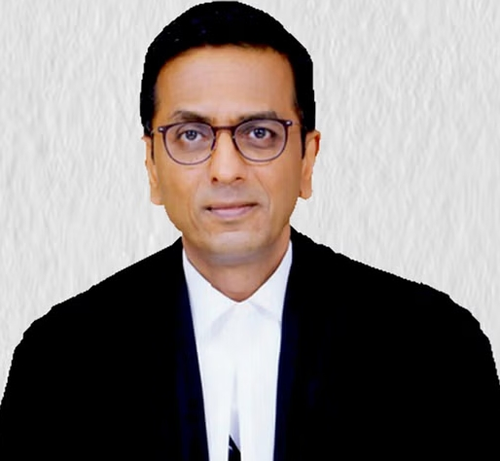India
Scientists from IIT and Germany explore interaction between two cyclones

Chennai, Aug 25 (IANS) A team of researchers from Indian Institute of Technology (IIT) of Madras and Hyderabad along with those from Germany’s Potsdam Institute of Climate Impact Research (PIK) used a novel, data-driven approach to explore the problem of tropical cyclones merging with each other.
Over the years, tropical cyclones have ravaged the coastlines of not only the Indian subcontinent, but the whole of southern Asia, Australia, and the tropical regions of the Americas, to name a few.
To date, the mechanisms behind the formation and propagation of these weather extremes and their interactions with the neighbouring weather systems lack a sound understanding and are active areas of research and debate among meteorologists worldwide.
In the research, the team aimed to understand what happens when two tropical cyclones, in the same hemisphere, are close to each other.
In this case, as one cyclone starts affecting the other and vice-versa (this interaction is referred to as “Fujiwhara interaction” by meteorologists), there can be number of possible outcomes — their trajectories and/or strengths may suddenly change, or they can merge to form a much stronger cyclone.
Such binary interaction of cyclones has neither been completely understood nor fully incorporated in weather prediction models, and therefore leads to erroneous forecasts. Such inaccurate forecasts increase the threat to life and property due to unpreparedness caused by misinformation and the lack of early warning.
“Analysing cyclone interactions using the novel framework pioneered in this study has the potential to improve the accuracy of the early warning signals provided by meteorological organisations to the government so that they can take pre-emptive and early action to reduce the impact of such disasters,” said Prof. RI. Sujith, Department of Aerospace Engineering, from IIT Madras, in a statement.
A complex network encodes the pattern of interaction of a complex system, and can be directly applied to study the Fujiwhara interaction between two cyclonic vortices.
Indicators derived from this methodology were found to clearly distinguish the different stages of mutual interaction between two cyclones and provide an early indication of cyclone merger, often better than conventionally used indicators such as the separation distance between two cyclones.
“We believe that this network-based approach can be used to study binary cyclone interactions from observational or model-based relative vorticity data to obtain better insights on the possibility of cyclone merger. It paves the path to analyse such highly unusual/rare events in which sudden alteration of cyclone tracks or re-strengthening occurs, on a case-by-case basis, and facilitate improved prediction of cyclone tracks and the fate of such interactions,” said lead author Dr Somnath De, from IIT Madras’ Department of Aerospace Engineering.
“Data-driven methods for prediction of extreme weather events have a unique advantage since they allow one to identify critical patterns in the evolution of such weather events that are elusive to traditional methods,” added Dr. Vishnu R. Unni from IIT Hyderabad.
Their findings are published in Chaos: An Interdisciplinary Journal of Nonlinear Science.
India
Without justice existence of any nation is not possible: PM Modi

New Delhi, Feb 3 (IANS) Prime Minister Narendra Modi on Saturday said that without justice the existence of any nation is not possible.
“Justice is at the root of independent self-governance and without justice even the existence of any nation is not possible,” Modi said while during the inauguration of the Commonwealth Legal Education Association (CLEA) – Commonwealth Attorneys and Solicitors General Conference (CASGC) in New Delhi.
He said when a society collaborates that it is easy to understand each other’s system better.
“Greater understanding brings greater synergy; synergy boosts better and faster justice delivery,” he said.
The theme of the conference was ‘Cross-Border Challenges in Justice Delivery’. The conference will deliberate on important issues pertaining to law and justice like judicial transition and the ethical dimensions of legal practice; executive accountability; and revisiting modern-day legal education, among others.
Throwing light on the radical changes in the nature and scope of crime in recent times, PM Modi pointed out the vast networks created by criminals across countries and their usage of the latest technology both in funding and operations.
He also drew attention to the fact that economic crimes in one region are being used to fund activities in other regions, and the challenges of the rise of cryptocurrency and cyber threats.
He also highlighted that reform cannot take place without making the justice system more citizen-centric as ease of justice is the pillar of justice delivery.
On Lok Adalats or ‘people’s court’, he said that it provides a settlement mechanism for small cases related to public utility services and is a pre litigation service where thousands of cases are resolved while ensuring ease of justice delivery.
Giving insights into realising the potential of women in every domain, PM Modi suggested making each domain inclusive at the educational level.
He said that an increase in the number of women in law schools will lead to an increase in the number of women in the legal profession.
He also suggested exchanging ideas on how more women can be brought into legal education.
PM Modi pointed out that India’s legal system was inherited from colonial times, but the last few years have witnessed a record number of reforms.
He mentioned the abolition of thousands of obsolete laws from colonial times, some of which had the potential to become tools to harass people, and underlined that it has boosted ease of living and ease of doing business.
“India is also modernising laws to reflect the present realities,” Modi said, highlighting that the three new legislations have replaced more than 100-year-old colonial criminal laws.
“Earlier, the focus was on punishment and penal aspects. Now, the focus is on ensuring justice. Therefore, citizens have a sense of assurance rather than fear,” he said.
India
Tasking Ahmed requests BCB to not consider him for Test cricket: Report

New Delhi, Feb 3 (IANS) Bangladesh pacer Taskin Ahmed has requested the Bangladesh Cricket Board (BCB) to not consider him for Test cricket as he is battling a lingering shoulder injury, and desires to focus solely on white-ball cricket, according to a report.
Cricbuzz reported that Taskin has written a letter to the Bangladesh Cricket Board (BCB), pleading for consideration in limited-overs formats to aid his recovery. BCB officials confirmed the development to Cricbuzz but emphasized the need for a comprehensive discussion after the ongoing Bangladesh Premier League (BPL) season.
“He (Taskin) had sent a letter stating that he does not want to play longer-version cricket. After the game (of the ongoing BPL) is over, we will sit with him in this regard,” said Jalal Yunus, BCB’s cricket operation chairman to Cricbuzz.
The decision awaits the input of head coach Chandika Hathurusingha, who has been informed about Taskin’s intentions.
Taskin’s shoulder injury, sustained during the World Cup 2023 match against India, has been a persistent hurdle in his career. Following the tournament, Taskin was sent to a rehabilitation program to regain full fitness and start competitive cricket again. As a result, he missed the two-match Test series at home against New Zealand and the white-ball return tour that followed soon after.
The dilemma extends beyond the pitch, as Taskin faces the prospect of surgery and a prolonged absence from the game. The BCB’s cautious approach, evident in denying Taskin a NOC for the Indian Premier League (IPL), showcases their concerns about the injury-prone fast bowler.
Interestingly, Mustafizur Rahman, another prominent pacer from Bangladesh too opted out of red-ball cricket to focus on white-ball formats.
While BCB granted NOC to Mustafizur for the IPL, the decision remains contentious for Taskin and Shoriful Islam, both representing the country in Test cricket.
India
Now, drones to monitor illegal mining activities in Gurugram, Nuh

Gurugram, Feb 3 (IANS) The mining department will soon start using drones to keep tabs on illegal mining in Gurugram and Nuh districts.
Recently, the district administration of Gurugram and Nuh have received complaints regarding illegal mining in Rithoj village in Gurugram and Nuh after which the department has decided to use drones to keep an eye on illegal mining.
Anil Atwal, the Mining Officer of Gurugram, who also has additional charge of Nuh distinct said, the department has sent a recommendation of three drones — one for Gurugram district and two for Nuh district — to Gurugram Metropolitan Development of Authority (GMDA) to keep an eye on illegal mining in both the districts.
“Once drones would be procured on time and made available to the mining department, the team will every week conduct survey wherever illegal mining is suspected,” he said.
The officer further said with the help of drones, it will be easy for the officials to access the situations of illegal mining and will also keep an eye on people and vehicles involved in illegal mining.
“With the help of drones, it will be easy for us to keep a watch on large areas of suspected mining locations. If we receive any complaint regarding illegal mining, the team will visit the spot and fly the drones to access the current situation of the spot,” he said.
Atwal also informed that from April 2023 to January 2024, around 46 vehicles, involved in illegal mining, have been seized in Gurugram while 147 vehicles were seized in Nuh district and a fine has been imposed on them.
India
CJI Chandrachud bats for equitable access to legal education

New Delhi, Feb 3 (IANS) Batting for equitable access to legal education, Chief Justice of India (CJI) D.Y. Chandrachud on Saturday said that admissions processes to law schools should not only consider academic performance but also factors such as socioeconomic background, diversity, and life experiences.
Delivering an inaugural address at 2024 Commonwealth Attorneys and Solicitors General Conference (CASGC), CJI Chandrachud said that as we strive to modernise legal education, we must also confront the question of equitable access to legal education.
“Entrance tests for admission to law schools must not be exclusionary. We must ensure that our admissions processes are fair, transparent, and inclusive,” he said.
Speaking further, CJI Chandrahcud said that law officers serve as the primary point of contact between the courts and the government and they not only function as representatives of the government but also as officers of the court.
“Law officers bear a greater responsibility in upholding ethical standards compared to private practitioners, given their role as guardians of the rule of law. …It is imperative that law officers remain impervious to the politics of the day and conduct themselves with dignity in court, ensuring the integrity of legal proceedings,” he said.
The Supreme Court has repeatedly emphasised that law officers and professionals should not only assist the administration of justice but also uphold the honour of the legal profession through exemplary conduct from both within and outside the courtroom, he added.
Citing eCourts Project which aims to leverage technology to improve access to justice for all citizens, CJI Chandrachud said that technology should bring about a transformation, not just automation.
“We must ensure that technological solutions are designed keeping in mind equity and inclusivity, taking into account the diverse needs and capabilities of all our stakeholders,” he said.
Chief Justice Chandrachud said that the Sustainable Development Goals — calling for action to end poverty, protect the planet, and ensure prosperity for all — resonate deeply with our core constitutional principles of justice, equality, and human rights and these goals are not specific to just India but are intrinsic part of all legal systems.
Prime Minister Narendra Modi on Saturday inaugurated the Commonwealth Legal Education Association (CLEA) – Commonwealth Attorneys and Solicitors General Conference (CASGC) 2024 at Vigyan Bhawan.
The Conference will see participation of Attorney Generals and Solicitors from the Commonwealth nations spanning the Asia-Pacific, Africa, and the Caribbean along with various international delegations.
The conference themed ‘Cross-Border Challenges in Justice Delivery’ will deliberate on important issues pertaining to law and justice like judicial transition and the ethical dimensions of legal practice; executive accountability; and revisiting modern-day legal education, among others.
India
Law Commission recommends amendments in Prevention of Damage to Public Property Act

New Delhi, Feb 3 (IANS) The 22nd Law Commission, chaired by Justice Ritu Raj Awasthi (retd), has recommended amendments in the Prevention of Damage to Public Property Act saying that the law passed in 1984 seems to have failed in its stated objective of preventing the destruction of public property.
The panel said that destruction of public property has continued undiminished and the scale of destruction has only increased over the years causing gargantuan losses to the public exchequer and inconvenience to the general public.
It said that the Commission suo moto undertook to prepare its 284th report and did an extensive study of the subject after analysing various relevant constitutional and statutory provisions, numerous judicial pronouncements by the courts across the country, and the incidents involving large scale destruction of public property.
Parliament in 1948 enacted the ‘Prevention of Damage to Public Property Act’ criminalizing the acts of vandalism directed at public property.
In 2009, the Supreme Court took suo moto cognizance of destruction of public property and issued certain guidelines based on two reports submitted by Justice K. T. Thomas-led committee and Fali S. Nariman-led committee.
The Commission said that the courts in India have been at the forefront in recognizing the right to protest as a facet of the right to freedom of speech and expression and at the same time, cautioned that such right needs to be exercised with restraint and at all times, peacefully.
In its report, the law panel also recommended introducing a separate law or amending Bharatiya Nyaya Sanhita or the Indian Penal Code to tackle the issue of prolonged willful obstruction of public property.
-
Video1 year ago
PM Modi Attacks Congress in Karnataka with “Kerala Story”
-
Cricket1 year ago
CSK players rejoice 5th IPL title with their families (Pics)
-
Politics1 year ago
Siddaramaiah & DK Shivakumar sworn in as Chief Minister & Deputy CM respectively
-
Entertainment1 year ago
Karan Deol weds his longtime Girlfriend Drisha Acharya (Pics)
-
Entertainment1 year ago
Urvashi Rautela dazzles on Cannes 2023 red carpet (Pics)
-
Entertainment1 year ago
Sunny Leone gets ready for Kennedy premiere in Cannes (Pics)
-
Entertainment1 year ago
Alia Bhatt looks crazy beautiful in Prabal Gurung creation at MET GALA 2023 (Pics)
-
Sports6 years ago
History Of Official FIFA WORLD CUP Match balls




























